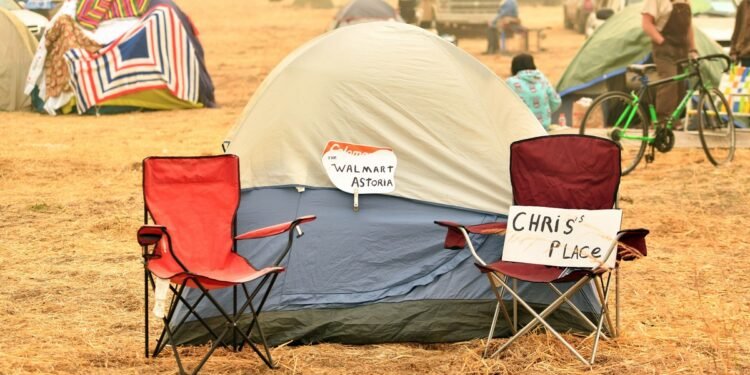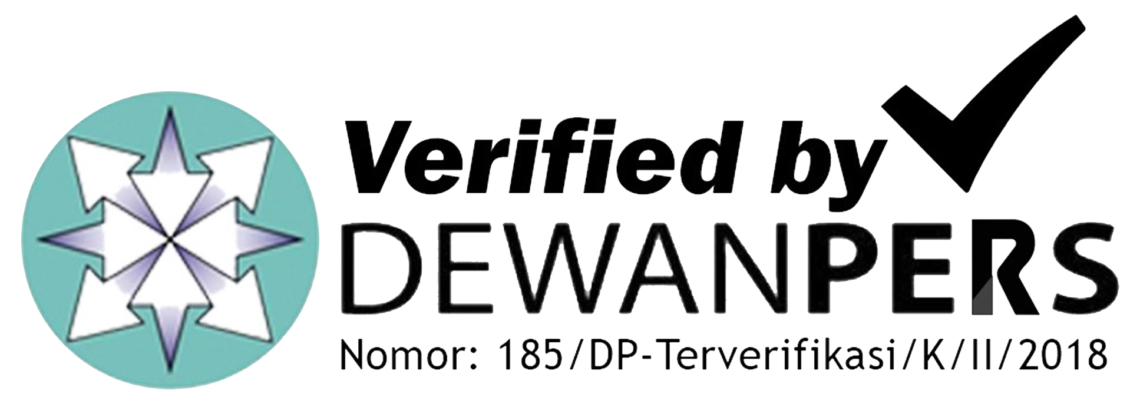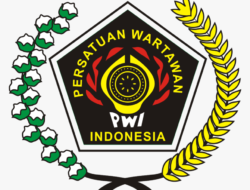[ad_1]
A makeshift address is seen on a tent at an evacuee encampment in a Walmart parking lot in Chico, California on November 15, 2018. Image via Getty.
It’s time to wake up. On Global Climate Day of Action, VICE Media Group is solely telling stories about our current climate crisis. Click here to meet young climate leaders from around the globe and learn how you can take action.
When smoke from wildfires in the western United States covered the skies of cities in the Pacific Northwest in a thick orange haze, public health officials warned people to avoid outdoor activities.
But with hundreds of individuals living unhoused in Vancouver and Victoria with little or no available shelter space—and many indoor public spaces closed due to COVID-19—these communities were faced with few options.
“It’s pretty tough when you live in a cloth tent, though, cause the atmosphere is going to be right there with you,” said Shae Smith, an unhoused resident in Victoria’s Beacon Hill Park.
Smith, however, hardly noticed the smoke, as he said he was preoccupied with the daily challenges of living unhoused. “When you’re homeless, you’re pretty used to the world around you kind of crashing and burning.”
Collin Spikes, a resident of an encampment near Crystal Pool in Victoria, said people in the unhoused community sought out temporary respite in fast food chains to escape the conditions outside.
For over a week, Victoria and Vancouver continually reported “Very High Risk,” or 10+, on B.C.’s Air Quality Health Index—the highest level of air pollution possible. At one point, Vancouver even topped the list for the world’s worst recorded air quality.
“A few years ago, we had some pretty bad smoke, but nothing this big,” said Ross Addicott, an unhoused resident of Victoria.
Although he has lived in the city his whole life, Addicott says he had never experienced air quality that poor.
“As climate change worsens, the most vulnerable members of society will be the hardest hit,” said Anjum Hajat, an assistant professor of epidemiology at the University of Washington.
“Without immediate action, the unhoused community will bear the brunt of these disasters.”
The fires and smoke come at a time when British Columbia is dealing with both the coronavirus pandemic and an increasingly toxic street drug supply exacerbating the province’s drug overdose crisis. At least 2,450 Canadians have died by drug overdoses so far this year, which VICE News reported is due in part to the impact of COVID-19 lockdown measures and an unpredictable drug supply chain.
“It’s yet another obstacle put in their path,” said Grant McKenzie, director of communications at Our Place, a shelter and resource centre for unhoused people in Victoria.
“We’re dealing with a population that already has underlying health issues, so there’s a lot of threats to their life at this time, and that’s always a scary proposition.”
Due to the increased likelihood of exposure, those working outdoors or experiencing homelessness face greater risks from the smoke. According to Hajat, low-income individuals are often essential workers who have jobs that necessitate them spending time outside, including delivery people, farmworkers, construction workers, drivers, and other service industry workers.
“If an unhoused person has a serious health complication due to the smoke, that may have long lasting impacts,” she said. “For example, a heart attack or respiratory problem that degrades the quality of their lung function permanently may impact their long-term health.”
But in cities with a larger unhoused population, grappling with a pandemic means that moving everyone indoors on short notice can be a near impossible ordeal.
With new spacing restrictions to prevent the spread of the pandemic, already limited shelter spaces and indoor support facilities have been drastically reduced.
Our Place has been forced to cut their maximum indoor capacity from 200 people to 40. It’s able to offer masks, paramedic outreach workers, and some medical services, but is actively looking to expand their drop-in space to another downtown building.
Some municipalities have taken action to open additional daytime facilities for unhoused people to rest inside. But because of COVID, city-run facilities in Vancouver could only offer 45-minute slots.
Earlier this month, Victoria city councillors Jeremy Loveday and Sarah Potts brought forth a motion calling upon the province to extend the Extreme Weather Response program—which provides shelter for those in need from November 1 to March 31—to incorporate non-seasonal environmental events, such as wildfire smoke.
“As we see that climate change is causing more extreme and more frequent extreme weather events including a seemingly now annual forest fire smoke season, I think that it’s necessary that we adapt and make sure that we are taking steps that are both compassionate and common sense,” said Loveday.
“It just strikes me as inhumane that we have multiple health crises going on and we have people who are unable to go inside even in the face of some of the poorest air quality in the world.”
The motion passed unanimously, and will be voted on at a council meeting on Oct. 1.
In an email to VICE News, B.C.’s Ministry of Municipal Affairs and Housing said it’s exploring options similar to the Extreme Weather Response program for extreme heat or smoky conditions.
However, Loveday says the program is only a band-aid solution. While these smaller actions are important, he sees a need for larger changes, such as widespread social housing.
“I hope that these very unfortunate circumstances right now can be used to catalyze systemic change that prioritizes housing for all and bold climate action in a way that will protect people from these circumstances in the future,” said Loveday.
Hajat feels that there is much to be done before the next wildfire and hurricane seasons to find permanent solutions for those most affected by climate change. As well as affordable housing, Hajat proposed governments institute occupational standards to reduce the hazard for lower income employees in higher risk jobs, and introduce paid leave to give all workers the option to stay home when the risk from smoke is high.
“But really,” she said, “what we need is coordinated global policy that reduces carbon emissions.”
Follow Emily Fagan on Twitter.
When smoke from wildfires in the western United States covered the skies of cities in the Pacific Northwest in a thick orange haze, public health officials warned people to avoid outdoor activities.
But with hundreds of individuals living unhoused in Vancouver and Victoria with little or no available shelter space—and many indoor public spaces closed due to COVID-19—these communities were faced with few options.
“It’s pretty tough when you live in a cloth tent, though, cause the atmosphere is going to be right there with you,” said Shae Smith, an unhoused resident in Victoria’s Beacon Hill Park.
Smith, however, hardly noticed the smoke, as he said he was preoccupied with the daily challenges of living unhoused. “When you’re homeless, you’re pretty used to the world around you kind of crashing and burning.”
Collin Spikes, a resident of an encampment near Crystal Pool in Victoria, said people in the unhoused community sought out temporary respite in fast food chains to escape the conditions outside.
For over a week, Victoria and Vancouver continually reported “Very High Risk,” or 10+, on B.C.’s Air Quality Health Index—the highest level of air pollution possible. At one point, Vancouver even topped the list for the world’s worst recorded air quality.
“A few years ago, we had some pretty bad smoke, but nothing this big,” said Ross Addicott, an unhoused resident of Victoria.
Although he has lived in the city his whole life, Addicott says he had never experienced air quality that poor.
“As climate change worsens, the most vulnerable members of society will be the hardest hit,” said Anjum Hajat, an assistant professor of epidemiology at the University of Washington.
“Without immediate action, the unhoused community will bear the brunt of these disasters.”
The fires and smoke come at a time when British Columbia is dealing with both the coronavirus pandemic and an increasingly toxic street drug supply exacerbating the province’s drug overdose crisis. At least 2,450 Canadians have died by drug overdoses so far this year, which VICE News reported is due in part to the impact of COVID-19 lockdown measures and an unpredictable drug supply chain.
“It’s yet another obstacle put in their path,” said Grant McKenzie, director of communications at Our Place, a shelter and resource centre for unhoused people in Victoria.
“We’re dealing with a population that already has underlying health issues, so there’s a lot of threats to their life at this time, and that’s always a scary proposition.”
Due to the increased likelihood of exposure, those working outdoors or experiencing homelessness face greater risks from the smoke. According to Hajat, low-income individuals are often essential workers who have jobs that necessitate them spending time outside, including delivery people, farmworkers, construction workers, drivers, and other service industry workers.
“If an unhoused person has a serious health complication due to the smoke, that may have long lasting impacts,” she said. “For example, a heart attack or respiratory problem that degrades the quality of their lung function permanently may impact their long-term health.”
But in cities with a larger unhoused population, grappling with a pandemic means that moving everyone indoors on short notice can be a near impossible ordeal.
With new spacing restrictions to prevent the spread of the pandemic, already limited shelter spaces and indoor support facilities have been drastically reduced.
Our Place has been forced to cut their maximum indoor capacity from 200 people to 40. It’s able to offer masks, paramedic outreach workers, and some medical services, but is actively looking to expand their drop-in space to another downtown building.
Some municipalities have taken action to open additional daytime facilities for unhoused people to rest inside. But because of COVID, city-run facilities in Vancouver could only offer 45-minute slots.
Earlier this month, Victoria city councillors Jeremy Loveday and Sarah Potts brought forth a motion calling upon the province to extend the Extreme Weather Response program—which provides shelter for those in need from November 1 to March 31—to incorporate non-seasonal environmental events, such as wildfire smoke.
“As we see that climate change is causing more extreme and more frequent extreme weather events including a seemingly now annual forest fire smoke season, I think that it’s necessary that we adapt and make sure that we are taking steps that are both compassionate and common sense,” said Loveday.
“It just strikes me as inhumane that we have multiple health crises going on and we have people who are unable to go inside even in the face of some of the poorest air quality in the world.”
The motion passed unanimously, and will be voted on at a council meeting on Oct. 1.
In an email to VICE News, B.C.’s Ministry of Municipal Affairs and Housing said it’s exploring options similar to the Extreme Weather Response program for extreme heat or smoky conditions.
However, Loveday says the program is only a band-aid solution. While these smaller actions are important, he sees a need for larger changes, such as widespread social housing.
“I hope that these very unfortunate circumstances right now can be used to catalyze systemic change that prioritizes housing for all and bold climate action in a way that will protect people from these circumstances in the future,” said Loveday.
Hajat feels that there is much to be done before the next wildfire and hurricane seasons to find permanent solutions for those most affected by climate change. As well as affordable housing, Hajat proposed governments institute occupational standards to reduce the hazard for lower income employees in higher risk jobs, and introduce paid leave to give all workers the option to stay home when the risk from smoke is high.
“But really,” she said, “what we need is coordinated global policy that reduces carbon emissions.”
Follow Emily Fagan on Twitter.
[ad_2]
Source link









